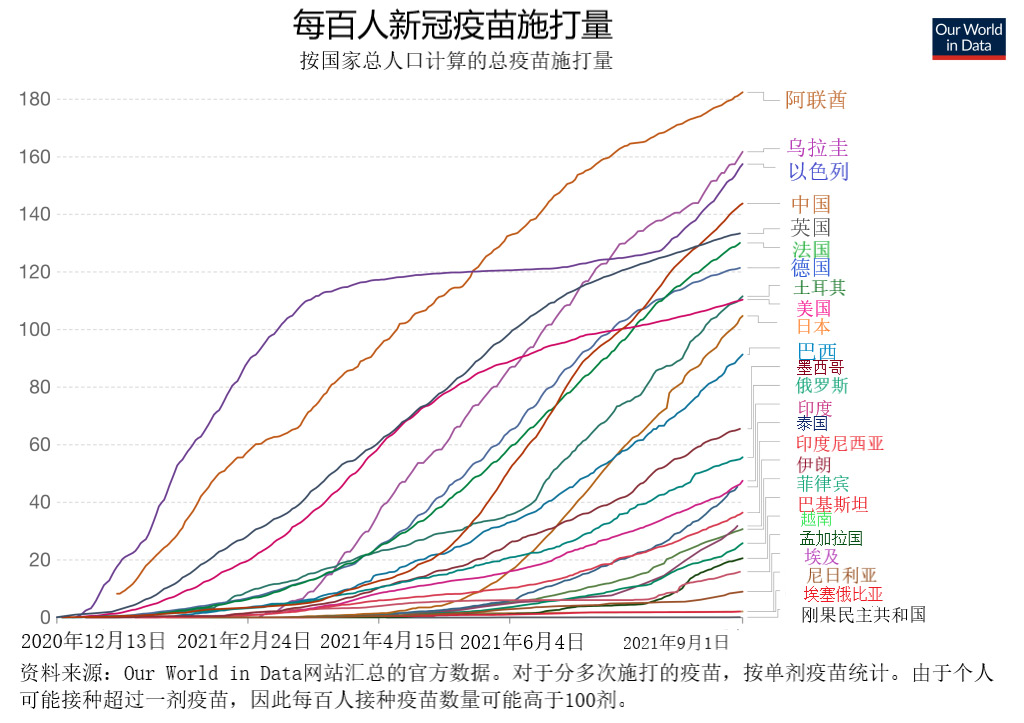医学专家在讨论全球疫情时通常不会用“令人震惊”和“犯罪”这种字眼。
但最近几天,一些全球顶尖新冠专家却变得异常愤怒,因为美国、一些欧盟国家和以色列均计划施打新冠疫苗加强针,传染病专家警告加强针计划将导致落后国家的疫苗剂量大幅减少,延长疫情,最终导致更危险的新冠变种病毒传播。
世界卫生组织的总干事谭德塞于9月1日在柏林说:“我们不希望看到已经完成疫苗接种的健康人大范围施打加强针。”他重申世界卫生组织之前的呼吁,要求各国将第三针疫苗施打计划推迟到下个月,从而使疫苗供应不足的贫困国家能够赶上发达国家。
谭德塞称:“我们看到疫苗供应方面依旧存在严重的不公平。”
加强针计划引起了全世界科学界和政府部门的混乱,人们不禁要问,既然富裕国家疫苗过剩,那么为什么不给贫穷国家?贫穷国家连给一小部分人接种疫苗都没有做到。
例如,美国当局决定从本月晚些时候开始为数以百万计美国人施打加强针疫苗,此举导致美国食品与药品管理局两名负责疫苗事务的官员在8月31日辞职表达抗议。
在这种高度紧张的情况下,疫苗制造商纷纷采取措施增加新冠疫苗产量,但许多疫苗都是加强针。
辉瑞(Pfizer)的加强针已经向美国食品与药品管理局递交审批,该疫苗将以Comirnaty之名销售,而欧洲药品管理局上个月批准了位于法国和德国的两家新辉瑞-BioNTech工厂生产加强针疫苗。Moderna正在扩大美国马萨诸塞州和新罕布什尔州的产量。
严重分歧
富裕国家和贫穷国家在新冠疫苗问题上的分歧日益加剧。
经济学人智库上周发布的一篇报告称,到目前为止的全世界50亿剂疫苗中,10个富裕国家施打了约75%,这种分裂到2023年可能给全球经济造成2.3万亿美元的损失。
比如,法国经过夏季提高疫苗接种率的大规模活动之后,在总计6,600万人口中,约有65.6%已经完成了疫苗接种。相比之下,非洲有12亿人,却只有2%完成了疫苗接种。
即便如此,在9月1日,法国成为向65岁以上人口提供第三剂加强针疫苗的首个欧盟国家,尽管欧盟的传染病主管部门于同一天表示加强针完全没有必要。
以色列已经有60%的人口施打了两剂辉瑞-BioNTech疫苗。7月,以色列开始向60岁以上人口施打加强针,成为首个施打加强针的国家。
这些国家的做法引起了知名科学家的强烈批评,他们认为加强针会直接影响贫穷国家的疫苗供应。
世界卫生组织的高级顾问、著名流行病学家布鲁斯·艾尔沃德在上周告诉《科学》(Science)杂志:“你要面对的是一种有限的零和资源。你们正在减少更急需疫苗国家的供应量。”
位于南非德班的夸祖鲁-纳塔尔大学(University of KwaZulu-Natal)的生物学家图里奥·德·奥利维拉告诉《科学》杂志,加强针“至少是不公平的,甚至可以说它等同于犯罪。”

欧洲疾病预防与控制中心(European Center for Disease Prevention and Control)认为,从医学角度看,加强针疫苗也没有必要。在9月1日的一篇报告中,该欧盟机构表示加强针“没有迫切的需求”,只有体弱多病者需要施打。该机构表示,人们显然忘记了疫苗的目的是防止住院治疗和死亡。报告称,在这方面,两剂新冠疫苗“目前能够提供较高的保护力。”
你可以试着把这番话告诉法国等富裕国家的普通人。这些国家都有足够的疫苗,能够在本地的药店或疫苗接种中心免费施打。
去年12月,法国的疫苗接种计划开局不利,因此法国总统埃马纽埃尔·马克龙一直在努力推动疫苗接种,甚至要求民众进入餐厅、酒吧、博物馆、电影院和购物中心等场所都需要出具完成疫苗接种的证明。
对于许多法国人而言,没有任何理由不接种第三剂疫苗。
法国服装公司Weill的首席执行官,68岁的伯纳德·韦尔于9月1日对美联社(Associated Press)说:“保证自己和身边人的身体健康,这就是第三剂疫苗的意义。”说这番话的时候,他正坐在巴黎右岸的一家药店,抢在第一天接种加强针疫苗。他表示,接种疫苗“没有什么好担心的,他也不关心。”
是的,富裕国家确实没有什么好担心的,至少目前如此。(财富中文网)
翻译:刘进龙
审校:汪皓
医学专家在讨论全球疫情时通常不会用“令人震惊”和“犯罪”这种字眼。
但最近几天,一些全球顶尖新冠专家却变得异常愤怒,因为美国、一些欧盟国家和以色列均计划施打新冠疫苗加强针,传染病专家警告加强针计划将导致落后国家的疫苗剂量大幅减少,延长疫情,最终导致更危险的新冠变种病毒传播。
世界卫生组织的总干事谭德塞于9月1日在柏林说:“我们不希望看到已经完成疫苗接种的健康人大范围施打加强针。”他重申世界卫生组织之前的呼吁,要求各国将第三针疫苗施打计划推迟到下个月,从而使疫苗供应不足的贫困国家能够赶上发达国家。
谭德塞称:“我们看到疫苗供应方面依旧存在严重的不公平。”
加强针计划引起了全世界科学界和政府部门的混乱,人们不禁要问,既然富裕国家疫苗过剩,那么为什么不给贫穷国家?贫穷国家连给一小部分人接种疫苗都没有做到。
例如,美国当局决定从本月晚些时候开始为数以百万计美国人施打加强针疫苗,此举导致美国食品与药品管理局两名负责疫苗事务的官员在8月31日辞职表达抗议。
在这种高度紧张的情况下,疫苗制造商纷纷采取措施增加新冠疫苗产量,但许多疫苗都是加强针。
辉瑞(Pfizer)的加强针已经向美国食品与药品管理局递交审批,该疫苗将以Comirnaty之名销售,而欧洲药品管理局上个月批准了位于法国和德国的两家新辉瑞-BioNTech工厂生产加强针疫苗。Moderna正在扩大美国马萨诸塞州和新罕布什尔州的产量。
严重分歧
富裕国家和贫穷国家在新冠疫苗问题上的分歧日益加剧。
经济学人智库上周发布的一篇报告称,到目前为止的全世界50亿剂疫苗中,10个富裕国家施打了约75%,这种分裂到2023年可能给全球经济造成2.3万亿美元的损失。
比如,法国经过夏季提高疫苗接种率的大规模活动之后,在总计6,600万人口中,约有65.6%已经完成了疫苗接种。相比之下,非洲有12亿人,却只有2%完成了疫苗接种。
即便如此,在9月1日,法国成为向65岁以上人口提供第三剂加强针疫苗的首个欧盟国家,尽管欧盟的传染病主管部门于同一天表示加强针完全没有必要。
以色列已经有60%的人口施打了两剂辉瑞-BioNTech疫苗。7月,以色列开始向60岁以上人口施打加强针,成为首个施打加强针的国家。
这些国家的做法引起了知名科学家的强烈批评,他们认为加强针会直接影响贫穷国家的疫苗供应。
世界卫生组织的高级顾问、著名流行病学家布鲁斯·艾尔沃德在上周告诉《科学》(Science)杂志:“你要面对的是一种有限的零和资源。你们正在减少更急需疫苗国家的供应量。”
位于南非德班的夸祖鲁-纳塔尔大学(University of KwaZulu-Natal)的生物学家图里奥·德·奥利维拉告诉《科学》杂志,加强针“至少是不公平的,甚至可以说它等同于犯罪。”
欧洲疾病预防与控制中心(European Center for Disease Prevention and Control)认为,从医学角度看,加强针疫苗也没有必要。在9月1日的一篇报告中,该欧盟机构表示加强针“没有迫切的需求”,只有体弱多病者需要施打。该机构表示,人们显然忘记了疫苗的目的是防止住院治疗和死亡。报告称,在这方面,两剂新冠疫苗“目前能够提供较高的保护力。”
你可以试着把这番话告诉法国等富裕国家的普通人。这些国家都有足够的疫苗,能够在本地的药店或疫苗接种中心免费施打。
去年12月,法国的疫苗接种计划开局不利,因此法国总统埃马纽埃尔·马克龙一直在努力推动疫苗接种,甚至要求民众进入餐厅、酒吧、博物馆、电影院和购物中心等场所都需要出具完成疫苗接种的证明。
对于许多法国人而言,没有任何理由不接种第三剂疫苗。
法国服装公司Weill的首席执行官,68岁的伯纳德·韦尔于9月1日对美联社(Associated Press)说:“保证自己和身边人的身体健康,这就是第三剂疫苗的意义。”说这番话的时候,他正坐在巴黎右岸的一家药店,抢在第一天接种加强针疫苗。他表示,接种疫苗“没有什么好担心的,他也不关心。”
是的,富裕国家确实没有什么好担心的,至少目前如此。(财富中文网)
翻译:刘进龙
审校:汪皓
“Shocking” and “criminal” are not usually words medical specialists use when discussing a global pandemic.
But in recent days, some of the world’s top experts on COVID-19 have erupted in anger as the U.S., some European Union countries, and Israel roll out plans for vaccine booster shots—programs that infectious-disease experts warn could leave poor countries with deep shortfalls of doses, prolong the pandemic, and potentially spawn more dangerous coronavirus variants.
“We do not want to see widespread use of boosters for healthy people who are fully vaccinated,” the World Health Organization’s Director-General Tedros Adhanom Ghebreyesus said in Berlin on September 1, repeating the WHO’s earlier call for countries to delay their third-jab plans until next month, so that poor countries could work to catch up in their inadequately supplied vaccination programs.
“We still see shocking inequities in access to vaccines,” Dr. Tedros said.
Plans for booster shots have roiled the scientific community and governments around the world, as questions mount over how rich countries have been able to hoard excess vaccine doses while dozens of poor countries struggle to immunize more than a tiny percentage of people.
In just one example, the decision by U.S. authorities to start administering booster shots to millions of Americans beginning later this month reportedly prompted two top vaccine officials of the Food and Drug Administration to quit in protest on August 31.
In this highly combustable situation, vaccine manufacturers have made moves to increase production of COVID-19 doses—but in many cases for booster shots.
Pfizer has applied to the FDA for approval for its booster shot, marketed under the name Comirnaty, and in Europe, the European Medicines Agency last month approved two new Pfizer-BioNTech sites, in France and Germany, to manufacture booster shots. Moderna is scaling up production in Massachusetts and New Hampshire.
Deep divide
If anything, the deep divide between rich and poor countries has grown when it comes to COVID-19 vaccines.
About 75% of the world’s 5 billion vaccine doses so far have been administered in just 10 rich countries—a schism that could cost the global economy up to $2.3 trillion by 2023, according to a report last week by the Economist Intelligence Unit.
In France, for example, about 65.6% of the country’s 66 million are now fully vaccinated, after a major summer campaign to boost immunization rates. By comparison, a minuscule 2% of Africa’s 1.2 billion people are fully vaccinated.
Even so, on September 1 France became the first EU country to offer third-dose booster shots to anyone over 65—a program that even the EU’s own infectious-disease agency said on September 1 was unnecessary.
In July, Israel, where 60% of people are double-vaccinated with the Pfizer-BioNTech vaccine, became the first country to administer booster shots, which they offer to anyone over 60.
Those programs have ignited fierce criticism from leading scientists, who say the booster shots directly impact the vaccines available for poorer countries.
“You’re dealing with a finite, zero-sum resource,” renowned epidemiologist Bruce Aylward, a senior adviser to the WHO, told Science magazine last week. “You are reducing supply for those who need it more.”
Tulio de Oliveira, a biologist at the University of KwaZulu-Natal in Durban, South Africa, told the magazine that the booster shots were “unfair to say the least, potentially…even criminal.”
Booster shots might also be medically unnecessary, according to the European Center for Disease Prevention and Control. In a report on September 1, the EU agency said “there is no urgent need” for booster shots, unless people are in frail health. It said that people have apparently forgotten the purpose of vaccines: to prevent hospitalization and death. In that, the report says, two COVID-19 vaccine doses are “currently highly protective.”
Yet try telling that to regular citizens in rich countries like France, where COVID-19 vaccine doses are plentiful, given at local pharmacies or vaccination centers, and free of charge.
French President Emmanuel Macron drove a massive push to vaccinate the country after a sluggish start to its vaccine program last December—even mandating proof of full vaccination to enter restaurants and bars, museums, movie theaters, and shopping centers.
For many French, there seems no reason why not to receive a third jab.
“When you’re in good health and people around you are in good health, that’s what matters,” Bernard Weill, 68, CEO of the French clothing company Weill, told the Associated Press on September 1, sitting in a pharmacy in Paris’s Right Bank district, where he rushed to get his booster shot on the first day it was available. The vaccine jabs, he said, were “nothing to worry about and nothing to care about.”
Nothing to worry about, that is, for rich countries, and at least for now.






